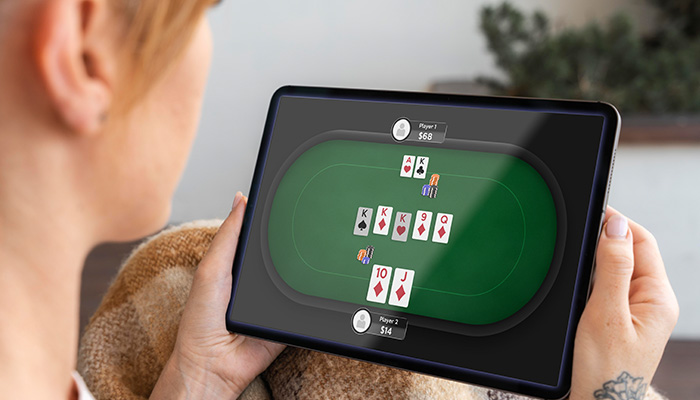Free Online Poker for Beginners: A Complete Guide
 Free Online Poker for Beginners
Free Online Poker for Beginners
- Free Online Poker Sites for Beginners: A Comprehensive Guide
- Exploring Free Online Poker Games for Beginners
- Mastering the Basic Rules of Online Poker
- Understanding Poker Hands
- Winning Strategies for Beginner Poker Players
- Online Poker Etiquette
- Bankroll Management Tips
- Frequently Asked Questions
If you’re looking for free online poker for beginners, you’ve come to the right place. In today’s post, we’ll cover everything from finding the best free online poker sites for beginners, to teaching you the basics of the game. We’ll walk you through everything you need to know – from different poker hands to useful strategies, and we’ll even look at the proper etiquette to keep in mind when playing!
To kick things off, let’s take a look at free online poker sites for beginners – and how you can go about finding the best ones.
Finding Free Online Poker Sites for Beginners
If you’re looking for free online poker sites for beginners, then you’ll be pleased to learn there are tons to choose from. Poker for beginners online is incredibly popular, and today, you’ll find more beginner-friendly sites than ever before.
These sites often offer games that are specifically designed for beginners – games that are simple to play and that offer friendly help and advice (often while playing), and tools to teach you more about the game and how it works.
In the rest of this guide, we’ll be looking into the basics of playing online poker. Our goal is to show you some of the basic strategies you need to succeed. We’ll also touch briefly on how you can go about finding the best poker sites, making sure you’re able to play in an environment you’re comfortable with.
Exploring Free Online Poker Games for Beginners
As you start looking at the free online poker games for beginners, it’s important that you understand some of the different types of poker. Texas Hold’em is the most popular variation of the game, and it’s the one that virtually all new players will end up playing.
In Texas Hold’em, each player receives two cards. Five community cards are dealt face-up on the table, and the goal is for players to create the best five-card hand using any combination of the two cards dealt to players, and the five face-up cards.
Another poker variation you’ll probably see online is Omaha, which is similar to Texas Hold’em. However, there’s a key difference, as each player is dealt four cards instead of two. They must then create the best five-card hand using exactly two of their cards and three from the board.
Seven Card Stud is another type of poker you may come across, although it’s a lot less common – and we wouldn’t really recommend it to beginners. In Seven Card Stud, players receive cards that are both face up and face-down, and the goal, again, is to create the best five-card hand possible.
We’ll talk more about the rules of playing poker below.
Mastering the Basic Rules of Online Poker
As we’ve seen, there are many different types of poker. For the purpose of today’s post, we’re going to focus on Texas Hold ’em – the most popular by far. Texas Hold’em poker is an exciting and popular card game that’s easy to learn, but it takes time and practice to master. We’re going to look at some of the basics – breaking the gameplay down, step-by-step for you.
The game is played with a standard 52-card deck, and at least two players are needed. The game starts with each player receiving two cards, which, in the poker world, are known as hole cards – these are dealt face-down. The dealer will then deal five community cards face up in the middle of the table, all of which can be used by all players to help them form their hand.
Before any cards are dealt, the two players to the left of the dealer post the small blind and big blind. These are mandatory bets, which ensure there is money involved in every hand.
The player who’s situated to the left of the player who places the big blind kicks things off in the first round of betting – known as pre-flop betting. They have the option to fold, call, or raise. The action continues clockwise, with each player having the same options. Once all players have finished betting, folding, or raising, the dealer will deal the flop.
The second round of betting then begins, with the player on the left of the dealer. They can check (make no bet) or bet. If they choose to check, the action moves to the next leftmost player, who can also call the check or bet. Once a bet has been made, all following players can call, raise, or fold. Once all of this betting has finished, the dealer reveals the next community card, known as the turn.
Another betting round follows, with the same rules as before. Then, the dealer deals the fifth and final community card, called the river. A final round of betting takes place, and if two or more players are left in the game, they turn their hands over, and the winner is paid the pot. It should be noted, if all but one player fold, the remaining player immediately wins, regardless of their hand.
This is known as the showdown, and it’s where players reveal what five-card hand they’ve been able to make. Hands are ranked in a certain order – details of which we’ll cover below. To create their final hand, players can use any combination of their hole cards and the community cards. If any players have the same hand, then it’s a tie – and the pot will be split evenly among the winners.
Understanding Poker Hands
Understanding poker hands is a very important part of learning how to play. Below, we’re going to look at a breakdown of poker hands, from the weakest to the strongest:
- High Card: If no one has a pair or better, the highest card wins.
- One Pair: Two cards of the same rank, like two 8s.
- Two Pair: Two separate pairs of matching cards, like two 6s and two 8s.
- Three of a Kind: Three cards of the same rank, like three 10s.
- Straight: Five consecutive cards of any suit, such as 5-6-7-8-9.
- Flush: Five cards of the same suit, not in consecutive order.
- Full House: A combination of a three of a kind and a pair, like three 7s and two 9s.
- Four of a Kind: Four cards of the same rank, like four Aces.
- Straight Flush: Five consecutive cards of the same suit, such as 3-4-5-6-7 of Hearts.
- Royal Flush: The highest straight flush, consisting of 10-J-Q-K-A, all of the same suit.
You should make sure you can remember these hand rankings before ever sitting down at the poker table. If you can’t list the hand rankings, then you’re not ready to play in real money games – it’s that simple.
Winning Strategies for Beginner Poker Players
Beginner poker players who want to improve their game can take advantage of a wide variety of strategies. Below, we’ll look at some tips to get you started:
- Be selective with your starting hands: As a beginner, it’s best not to get too involved with bluffs or playing weak hands. Instead, focus on playing strong hands – big pocket pairs and high-value cards like A-K.
- Be aware of your position at the table: Generally speaking, the later your position at the table (the closer you are to the button’s right), the more information you can pick up about your opponents’ actions, which can help you make more informed decisions.
- Learn to read your opponents: While this takes a lot of practice, it’s good to start analyzing your opponents. Look at how they bet, study their body language, and see whether they display any recurring tendencies you can exploit.
- Manage your emotions: Regardless of what’s going on at the table, it’s important to always remain focused, calm, and unemotional. Avoid going on “tilt” – making poor decisions based on frustration or impatience.
- Continuously learn and adapt: Study the game, watch poker videos, read books, and join poker forums to grow your knowledge and improve your skills.
When you’re playing free online poker for beginners, you won’t have to worry about these strategies as much. However, if you decide to move to real money play, these strategies will have more of an impact, and will directly influence the amount of money you’ll be able to win while playing at the leading Seven-Card Stud poker sites, for example!
Online Poker Etiquette
Learning about proper online poker etiquette is pretty important if you want to be able to maintain a friendly and enjoyable gaming environment at the table. When you’re playing poker online it’s easy to get caught up in the fast-paced nature of the game. However, you should always show respect to other players, and avoid using offensive language, insults, or making negative comments about how they play.
For example, if you run into abusive players at any of the best New Jersey poker sites, it’s best to mute, and then report them rather than getting involved in a debate with them. Ultimately, try to remember that everyone at the table is there to have a good time, and you can help to make everyone’s experience – including your own – much better by displaying good poker etiquette.
Lastly, take the time to familiarize yourself with the site’s rules and follow them, to avoid running into any problems. Just because you’re playing poker online doesn’t mean you shouldn’t treat others like you would in person – and below, we’re going to summarize the main do’s and don’ts covered above:
| Do’s | Don’ts |
|---|---|
| Be respectful to other players | Use offensive language or insults |
| Pay attention and act promptly | Take excessive time to make decisions |
| Mute or report abusive players | Reveal your cards in chat before showdown |
| Congratulate winners graciously | Gloat or criticize others’ play |
| Learn and follow the site’s rules | Accuse others of being a “fish” |
Bankroll Management Tips
If you’re playing free online poker games for beginners, then you won’t need to worry about bankroll management (although it could still help you in preserving your free credits). However, if and when you start playing online poker for real money, practicing bankroll management is vital. You should always begin by setting a budget; figure out how much you can afford (and are happy) to lose. No matter what happens, stick to this budget.
We always recommend beginners start with low-stakes games; this way, you can get a feel for how real money poker games work. If you start seeing success, you can gradually move up as your bankroll – and confidence – grows. This approach helps you avoid playing in games that are too expensive and that would put you up against much better players.
As a general rule of thumb, it’s recommended you avoid risking more than 5% of your bankroll in one session. Following this benchmark ensures you can endure the swings of poker without the risk of going broke too quickly.




